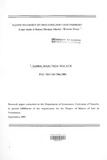| dc.description.abstract | Agriculture remains the backbone of the Kenyan economy glVen its contribution to
employment, foreign exchange, food and its linkages with other sectors of the economy.
Indeed the sector's performance directly mirrors that of the overall economy.
This study assessed the relationship of credit institutions' lending policies in determining
access to credit by smallholder cane farmers in Mumias sugar scheme. Primary cross-section
data was collected and analyzed using logit regression model.
The results of the study show that the inaccessibility of credit reflects lack of supply,
resulting from the rationing behaviour of credit institutions based on the farmer's education
status, farm size, time taken to process credit, account requirement, repayment method,
restrictions on credit use and credit amounts. The study concludes that given the established
network of credit institutions, improving lending terms and conditions in favour of the
smallholder farmers would provide an important avenue for facilitating their access to credit.
Similarly, access to credit by smallholder farmers can be increased by educating farmers,
timely issue of credit funds, improving the repayment method and increasing the amount of
credit. | en |

